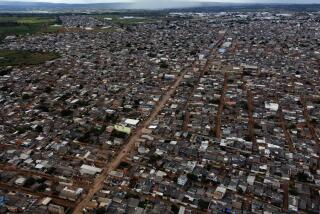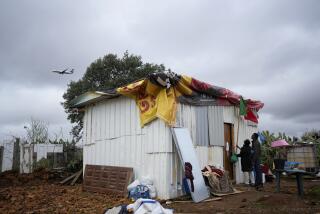Rio’s Vital Expansion Intrigues Foreign Property Investors
- Share via
RIO DE JANEIRO, BRAZIL — Despite a biannual wage boost that can barely keep pace with the country’s spiraling inflation, Brazilians manage to put on a happy face.
They communicate a refreshing vitality and optimism that is most apparent in this seaport city, where spurts of growth and urban expansion provide tempting opportunities for foreign investors.
Few may be prepared to buy developer Antonio Galdeano’s $20-million mountain property with a sweeping view of Rio’s coastline but, on the whole, they are finding real estate bargains in that city tempting.
Brazilian law began easing up on property ownership by foreigners some four years ago and gives them the same protection and guarantees that it gives to Brazilian nationals. Restrictions apply basically to the purchase of undeveloped open land along frontiers or the seashore.
“A foreigner may own property here, in his own name. He is taxed only on capital gains, and is allowed to take profits out of the country,” explained Victor Jessula, director of sales of the prestigious brokerage firm of Julio Bogoricin (with headquarters in Rio and offices in New York).
“Traditionally, the most enthusiastic foreign real estate investors have been the Argentinians followed closely by Canadians. Americans currently buying in Rio are predominantly older couples who visited Rio in the past, fell in love with the city, and have returned frequently for one- or two-month stays,” Jessula said.
“Some buy in the beach areas, others prefer the cooler mountain resorts. Investment in the prime beach areas is most desirable because space there is at a premium and rentals are always in demand. Factors affecting the increasing value of beach properties in Copacabana, Ipanema and Leblon are: scarcity of remaining buildable sites and increased costs of new construction.”
“We now have four or five apartment buildings in Copacabana and Ipanema where each unit, with approximately 7,350 square feet, sells for about $1 million,” he added. “These are the newest and most luxurious along the beach front, and are comparable to the best, at any price, in any major metropolis of the world.
“A good purchase option is the ‘aparthotel’ unit with one or two bedrooms that can be bought for $35,000, with concierge, maid and other services included in a homeowner’s association fee. These units may be purchased and subleased, an ideal situation for Brazilians or foreigners who only vacation in Rio,” Jessula said.
There are also charming secluded shoreline resorts in the outskirts of Rio, Jessula commented. “For under $100,000, one can own a small apartment in the city and a weekend retreat as well.”
Marina Porto Buzios, a multi-phase project, is currently under development by Umberto Modiano, an affluent coffee exporter turned builder/developer, in the outskirts of the city, only 20 minutes from Rio by plane or some two hours by car. Already completed is the marina’s five-pronged canal system, a lagoon, a bridge, demarcation of lots and clubhouse sites.
Buzios, the closest community to Modiano’s new marina and hotel development, was an old fisherman’s village that mushroomed into the Brazilian “St. Tropez” after Brigitte Bardot feel in love with the area and built a home there.
The French actress has since left Buzios, but its reputed charm has spread far and today it is a posh little colony inhabited by artists, a favorite playground of the jet set and a haven for boutique and restaurant owners.
“I used to come to Buzios like everyone else, because it was a beautiful place in which to have fun, relax after a busy week. And I came so often that I finally decided to invest here,” Modiano explained.
Modiano acquired an island, Ilha Rasa, directly facing the marina on which he has built the Posada nas Rocas, a hotel resort currently in operation, that serves both as a destination or stopover for visiting boats.
It is the island’s single project, consisting of 40 bungalows (with an additional 20 under construction, each with veranda and hammock) and common areas with a swimming pool, main dining hall, bar and terraces, and special areas for entertainment and refreshments.
Modiano credits son Claudio with Posada nas Rocas’ design and overall plan. “We want to preserve it as the small paradise that it is, in a rustic motif, but without cutting in on any of the comforts people expect in a sophisticated retreat,” said young Modiano.
The Modianos keep a fleet of boats operating the half-mile stretch from the marina to the hotel, and any guest who wishes to go ashore can simply hail a boat.
Choice lots at the marina currently sell for about $15,000 on the main canal and are large enough to build a home with a swimming pool and/or tennis court. The estimated cost for construction of a weekend cottage in that area is between $15,000 and $20,000.
Marketing Potential
Last month, John Maschio of Chesshire Gibson Fowler, international real estate consultants based in Beverly Hills, was in Brazil at Modiano’s invitation to explore the marketing potential of Marina Porto Buzios for the American market.
A man of many contacts in Brazil, where as a former celebrity agent he staged a number of major international film festivals before entering into a career in real estate acquisition, Maschio also was scouting for hotel sites for possible development by the Hilton and Marriott chains.
“One attractive proposal we looked at was the well-laid plan of Antonio Galdeano for a hotel in the vicinity of Rio’s luxury Sheraton Hotel, which he hopes will attract a major American hotel chain,” Maschio said.
“The site is practically an entire mountain, 35 acres in all, most of which will be devoted to parklands and landscaping and only 178,200 square feet assigned to the hotel facility. Galdeano’s proposal includes a private cable car to transport guests from the mountain to the shore level.”
Fastest Growth Area
Maschio pinpointed the Barra da Tijuca as the fastest and most exciting growth area and the first master-planned community in Rio de Janeiro. Referred to simply as “Barra”, the district was conceived and approved under noted architect Lucio Costa’s master urban plan and has 11 1/2 miles of choice, unpolluted beaches. In the past seven years, since the area became readily accessible to commuters by means of two major new tunnels slicing through to the city’s central core, the population there has grown to 25,000.
The sprawling district is the first of Rio’s prime suburbs designed with the automobile in mind. Its concept is similar to master-planned developments throughout Southern California and incorporates the best of suburban America’s amenities--the neighborhood movie theaters, freeways, an airport, a major shopping center, schools, sports facilites, all within a plan that mandates an even distribution of single-family homes, condominium towers and office complexes.
Infrastructure in Place
Developers have been quick to buy parcels of the new district, following the lead of pioneer commercial developers like Carrefour, a large French supermarket chain. It now has its own, well-developed infrastructure.
Eric Ferrez, a young Rio businessman, and wife Beatriz live with their children in a condo unit they purchased in “Barra” five years ago, for about $110,000.
The apartment is in one of six towers in the gated Atlantico Sul, one of the area’s first major beachfront developments, with common areas that include a football field, barbecue area, playgrounds, bicycle and jogging tracks.
Ferrez’s 4,320-square-foot high-rise unit has six bedrooms and four baths (that includes the separate maids’ quarters), and its own outdoor pool in the unit’s spacious, main terrace.
The couple’s joint earnings place them in the upper middle-class economic bracket. But, said Ferrez candidly: “We’re fortunate to have bought our unit when we did because now we could no longer afford it. It has doubled in value.”
When approached on the advisability of taking off for Rio de Janeiro to purchase a bit of that paradise, Maschio was non-committal: “Rio is an incredibly alluring city and the land values are appreciating at a phenomenal pace, but risks are inherent to any type of real estate speculation.”
Tabs on the Economy
Leonard H. Rushfield, president of Republic International Bank of New York in Los Angeles, was a little more specific. His bank is affiliated with the Safra banking chain in Brazil and keeps close tabs on Brazil’s wavering economy.
The important thing is to deal with established brokers, among them Bogoricin, Patrimovel and R. Jardim, which have proven credibility, Rushfield said.
“Even in the strained foreign exchange of today, Brazilians take very seriously the ability to repatriate the capital which foreigners have invested, providing it has been registered with the Central Bank,” he added. The registration of foreign capital and of reinvestments, as well as repatriation of foreign capital, are regulated by Brazil’s Foreign Capital and Profit Remittance Law.
In answer to the question of taxation on roll-on transactions, Rushfield said the matter of capital gains in not that simple. “Transactions are taxed individually, but the tax would take into consideration the depreciation on the property (with a 20 or 30-year adjustment on buildings). The tax on capital gains is normally 25%.
Indexation for Inflation
“Another consideration would be the indexation for inflation. The rapid increase in cruzeiro value need not mean that you will be taxed excessively on that increase. The sales price would be measured against that indexation. In dollar terms you get good value.”
Foreigners do not qualify for mortgage loans but most developers now provide their own financing with the balance usually due within five years, unlike the national who usually is given 15 years to pay off the mortgage.
A property is bought a vista (all cash) or with a down payment and a balance to be paid on fixed installment payments through a private agreement with the seller. The interest rate (usually 10%) is adjusted to coincide with the inflation variable.
Any admonitions?
“In the present recessionary situation, the long-term purchase would be the wisest. Resale in Brazil is more difficult at the present time and with so much inflation, one may get a false impression of appreciation,” Rushfield said. “In dollar terms you do good value in Brazil today, but in the opinion of our Brazilian banking colleagues, the fast-buck turnaround that is not a realistic prospect.”
More to Read
Sign up for Essential California
The most important California stories and recommendations in your inbox every morning.
You may occasionally receive promotional content from the Los Angeles Times.













